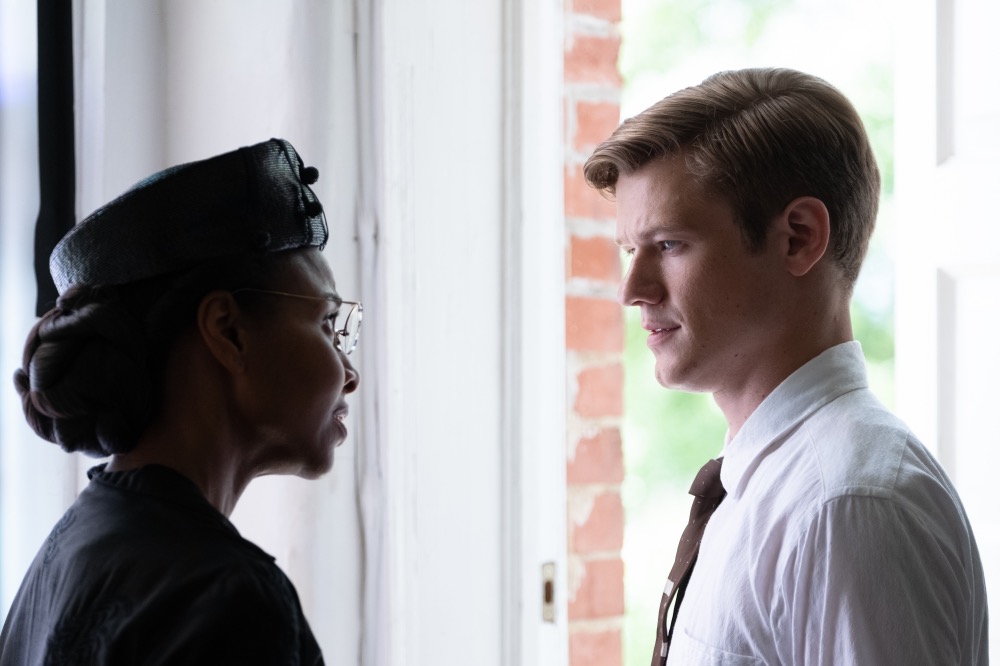
DAVID ADAMS watches ‘Son of the South’…
Son of the South (AU – M/UK – 15/US – PG-13)
In a Word: Relevant

Sharonne Lanier plays Rosa Parks and Lucas Till plays Bob Zellner in ‘Son of the South’.
Early on in Son of the South, the chief protagonist Bob Zellner encounters then veteran civil rights activist Rosa Parks while attending a service in Montgomery, Alabama’s, famous Brick-A-Day church.
In his senior year at college, Zellner, who is played by Lucas Till, is about to follow his friends in fleeing the church after police turn up (the students had defied the idea of segregation by attending a Black church) and is apparently baffled at why he should be arrested when he’s not taking sides – he and his friends are simply attending to aid their research for a paper they’re writing on racial justice. But that’s not an attitude Parks, played by Sharonne Lanier, thinks is sustainable.
“[Rosa Parks] observation that “not choosing is a choice” really sums up the journey that Zellner plays in Son of the South. Based on the book by the real Bob Zellner, The Wrong Side of Murder Creek, the film charts Zellner’s transformation from someone who grew up in a family that was proud to be in the Ku Klux Klan through to wanting to remain neutral on the issue of race and then actively joining the civil rights movement, in particular the Freedom Rides that directly challenged the odious idea of segregation.”
Stopping Zellner before he flees the church, Parks says something along the lines of: “You know, something really bad is going to happen right in front of you one day and you’re going to have to choose which side you’re on. Because not choosing is a choice.”
Her observation sums up the journey that Zellner embarks upon in Son of the South. Based on the 2008 autobiography by the real Bob Zellner, The Wrong Side of Murder Creek: A White Southerner in the Freedom Movement, the film charts Zellner’s transformation from someone who grew up in a family that was proud to be in the Ku Klux Klan through to wanting to remain neutral on the issue of race (partly to ensure his own future within that community) and then actively joining the civil rights movement, in particular the Freedom Rides that directly challenged the odious idea of segregation.
Directed by Barry Alexander Brown, who also wrote the screenplay (Spike Lee was executive producer), Son of the South plunges the viewer into the world of America’s South in the late 1950s and early 1960s, a time when the civil rights movement was building momentum in challenging the South’s status quo. We’re exposed here to the casual, everyday, racism that seems an endemic part of life along with shocking outbreaks of racist violence and the struggle of the civil rights activists as they try to find a non-violent way to bring about change.
Zellner straddles these two worlds and as he begins to move from one to the other, he finds himself ostracised by the community he once counted himself a part of. He has the support of his father – a Methodist minister who recounts in the film how he became “colourblind” after encountering an all-Black choir from his home town on a trip to Russia and subsequently left the Klan – but most definitely not that of his grandfather, an active Klan member played by Brian Dennehy, who gives what’s at times a chilling performance in what was his final big screen role before his death in April last year.
Despite the subject matter, there’s an understated tone to the film – while it could have been easy to sensationalise the racism and violence, Brown has instead shown here how such hatred was accepted by so many as simply being part of life in the South. Hence in a brawl on the street which takes place after a bus with Freedom Riders arrives, we see not just the usual angry old white men taking part in the violence that follows but the entire community.
There’s also the sense that change doesn’t always happen in one single moment in time but rather, as appears in Zellner’s case, can often be a more gradual turning about. And, of course, the film comes with its own sense of the absurd – the idea that a white Southern like Zellner could end up working in the Freedom movement (not unlike, though not as strong, as the absurdity we see in the 2018 film BlacKkKlansman which Brown edited).
Zellner’s is an inspirational story but, not unlike the story of the civil rights movement itself, it’s one which has many strands. Son of the South, while capturing only a relatively brief moment in that long struggle, does justice to both. And, with the issue of racial justice still making headlines today, not just in the US, but around the world, it’s also a timely look at what it takes to make a difference – and high cost that can go with it.





